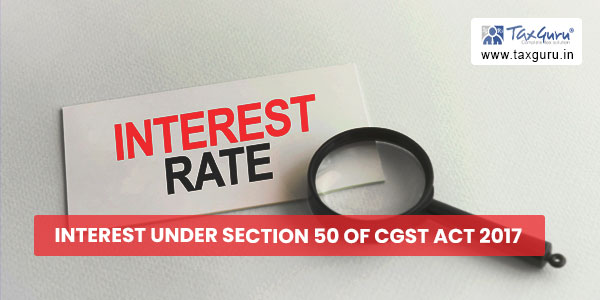PROVISIONS RELATED TO INTEREST UNDER GST ACT 2017
| Case | Sr. No. | Section of CGST Act. 2017 | Particulars | Rate of Interest |
| Interest payable/paid by RP | 1. | 50(1) | Not Deposit/Short deposit within prescribed time under the GST Act. 2017 | 18% |
| 2. | 50(3) | Claim of Wrong/undo ITC or Short showing Output liabilities u/s section 42(10) and 43(10) | 24% | |
| Interest payable/paid to RP | 3. | 54(12) | Interest on on hold of Refund by the Department | 6% |
| 4. | 56 | Late issue of Refund (within sixty days from the date of receipt of application under sub- section (1) of 54) | 6% | |
| 5. | 56 Proviso | If refund is not issued within 60 days in the compliance of order of Adjudication Authorities/Appellant Authorities/court | 9% |
(Notification No. 13/2017 Central Tax Dated 28/06/2017)
Interest provisions in GST law are covered under section 50(1) and section 50(3) of Central Goods and Services Tax Act, 2017.
Section 50. Interest on delayed payment of tax;
“50. (1) Every person who is liable to pay tax in accordance with the provisions of this Act or the rules made thereunder, but fails to pay the tax or any part thereof to the Government within the period prescribed, shall for the period for which the tax or any part thereof remains unpaid, pay, on his own, interest at such rate, not exceeding eighteen per cent., as may be notified by the Government on the recommendations of the Council.
[Provided that the interest on tax payable in respect of supplies made during a tax period and declared in the return for the said period furnished after the due date in accordance with the provisions of section 39, except where such return is furnished after commencement of any proceedings under section 73 or section 74 in respect of the said period, shall be levied on that portion of the tax that is paid by debiting the electronic cash ledger.] (w.e.f. 1st July, 2017 by s. 112 of The Finance Act, 2021 (No. 13 of 2021) dated 28th March, 2021
(2) The interest under sub-section (1) shall be calculated, in such manner as may be prescribed, from the day succeeding the day on which such tax was due to be paid.
(3) A taxable person who makes an undue or excess claim of input tax credit under sub-section (10) of section 42 or undue or excess reduction in output tax liability under sub-section (10) of section 43, shall pay interest on such undue or excess claim or on such undue or excess reduction, as the case may be, at such rate not exceeding twenty-four percent., as may be notified by the Government on the recommendations of the Council.”
Now it is important to understand the provisions of section 42 and 43.
Section 42:
♦ Although the term GSTR-2A reconciliation has not been used anywhere in this section, however matching of details of inward supplies received by a taxable person and declared in his valid return, should be done with the details of outward supplies furnished by the supplier in his valid return (hereinafter referred to as GSTR-1 of the supplier). Relevant text of section 42 (1) is reproduced below:
“42. (1) The details of every inward supply furnished by a registered person (hereafter in this section referred to as the “recipient”) for a tax period shall, in such manner and within such time as may be prescribed, be matched––
(a) with the corresponding details of outward supply furnished by the corresponding registered person (hereafter in this section referred to as the “supplier”) in his valid return for the same tax period or any preceding tax period;
(b) with the integrated goods and services tax paid under section 3 of the Customs Tariff Act, 1975 in respect of goods imported by him; and
(c) for duplication of claims of input tax credit.”
♦ Where the recipient has claimed ITC in excess of tax declared by the supplier in his GSTR-1 or supplier has not declared such supplies in his GSTR-1, discrepancy shall be communicated to both recipient and supplier.
♦ The discrepancy communicated above shall be rectified by the supplier in his return for the month in which discrepancy is communicated. If supplier does not take corrective action, recipient must add back ITC taken earlier to his output tax liability in for the month succeeding the month in which communication was received from department along with interest. – Section 42 (5)

♦ Since above reversal is under section 42 (5), interest will be charged @18% p.a.
“42. (3) Where the input tax credit claimed by a recipient in respect of an inward supply is in excess of the tax declared by the supplier for the same supply or the outward supply is not declared by the supplier in his valid returns, the discrepancy shall be communicated to both such persons in such manner as may be prescribed.
(5) The amount in respect of which any discrepancy is communicated under sub-section (3) and which is not rectified by the supplier in his valid return for the month in which discrepancy is communicated shall be added to the output tax liability of the recipient, in such manner as may be prescribed, in his return for the month succeeding the month in which the discrepancy is communicated.”
♦ Further section 42 (7) says, if supplier rectifies above discrepancy in later months, recipient can reclaim ITC so reversed by reducing his output tax liability for that particular month.
♦ However if recipient reclaims credit so reversed under section 42 (5) and supplier does not rectify discrepancy in his valid returns, such reclaim shall be added to his outward tax liability along with interest @24% p.a. – Section 42 (10) read with section 50 (3)
“42. (7) The recipient shall be eligible to reduce, from his output tax liability, the amount added under sub-section (5), if the supplier declares the details of the invoice or debit note in his valid return within the time specified in sub-section (9) of section 39.
(10) The amount reduced from the output tax liability in contravention of the provisions of sub-section (7) shall be added to the output tax liability of the recipient in his return for the month in which such contravention takes place and such recipient shall be liable to pay interest on the amount so added at the rate specified in sub-section (3) of section 50.”
Similar provisions are contained in section 43 and are dealing with credit note.
Useful Case Laws in this reference are as under:-
1. Maansarovar Motors Pvt. Ltd. V/s Assistance Commissioner 2021 W.P. No. 28437 of 2019 (Madras HC.)
2. M/s F1 Audto components Pvt. Ltd. V/s Sale Tax Officer 2021 W.P. no. 6631 of 2021 (Madras HC)
In case of Tax Evasion Section 73 or 74 of CGST Act. 2017
Section 73. Determination of tax not paid or short paid or erroneously refunded or input tax credit wrongly availed or utilised for any reason other than fraud or any willful-misstatement or suppression of facts.-
(1) Where it appears to the proper officer that any tax has not been paid or short paid or erroneously refunded, or where input tax credit has been wrongly availed or utilised for any reason, other than the reason of fraud or any wilful-misstatement or suppression of facts to evade tax, he shall serve notice on the person chargeable with tax which has not been so paid or which has been so short paid or to whom the refund has erroneously been made, or who has wrongly availed or utilised input tax credit, requiring him to show cause as to why he should not pay the amount specified in the notice along with interest payable thereon under section 50 and a penalty leviable under the provisions of this Act or the rules made thereunder.
Conclusion:-
1. Interest u/s 50 (3) are to be charged @24% p.a. only in case of reclaim of credit reversed earlier. Only cases covered u/s 42 (10) and 43 (10) are covered in section 50 (3).
2. In other cases interest will be paid @18% p.a. u/s 50 (1).
*******
Disclaimer : The Author disclaim all liability in respect to actions taken or not taken based on any or all the contents of this Insight report to the fullest extent permitted by law.
In case if you have any query or require more information please feel free to revert us anytime. Feedbacks are invited at mail to:- Mail To:info.knowthetax@gmail.com or contact at +91-9416692584






Hello Sir,If client has mention the liability in GSTR 1 but 3B is filed Nil due to some software error.He has corrected the liability in GSTR 9 by paying DRC-03 from Electronic Credit Ledger.Is he liabile to pay Interest on the same under section 50?
wrongly availed itc cgst 271000 and sgst 271000
instead of only Igst 271000/- interest to be calculated on 271000/- or 542000/-
What should be the “date on which tax become due” where AO has assessed the turnover u/s 74. Interest shall be calculated from the order u/s 74 or from the date of ending the tax period for which tax has been asessed?
Sir,
How do you interpret the phrase “remains unpaid” in S.50(1) & without deleting this phrase, whether the proviso added to S.50(1) is valid.
CA Om Prakash Jain s/o J.K.Jain, Jaipur
Tel 9414300730